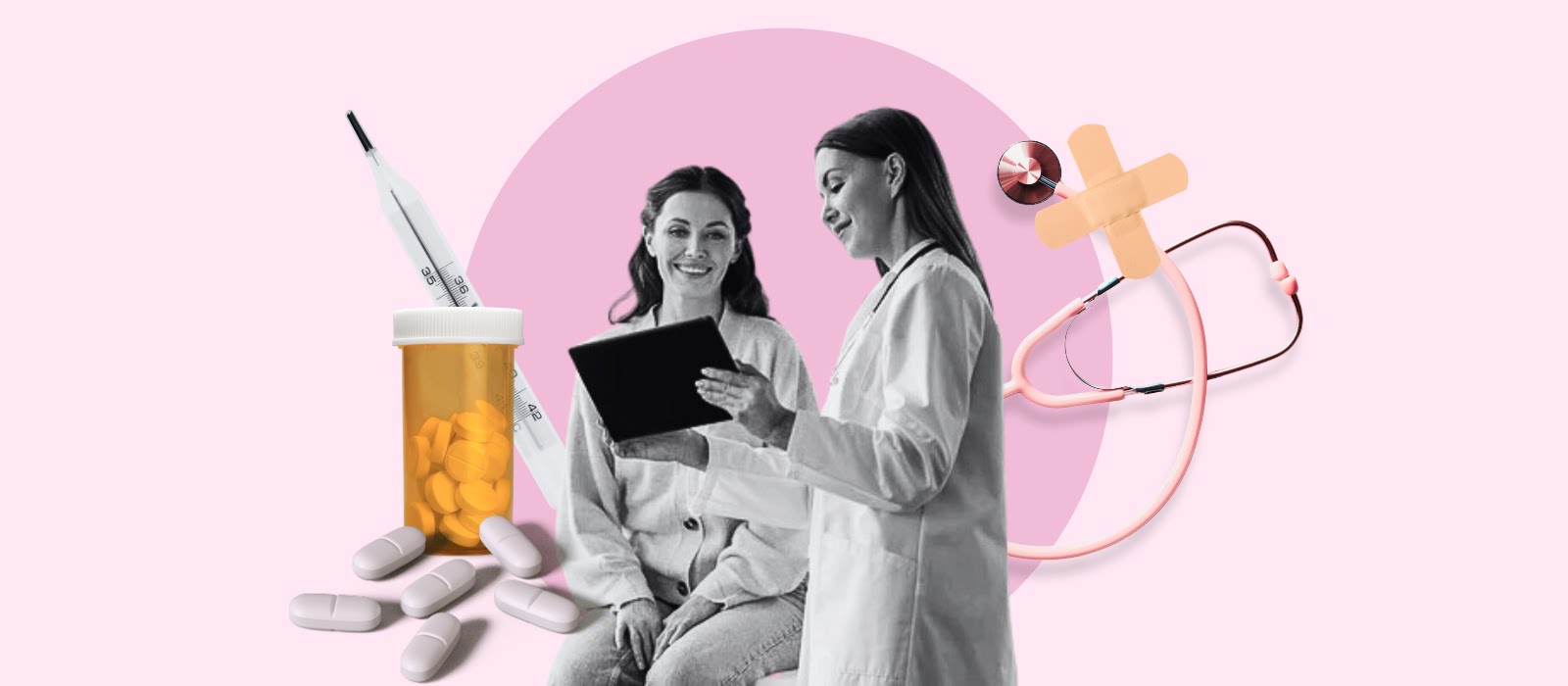
Everything you need to know about hormone health


From hormonal imbalances to PCOS, endometriosis and menopause, we’ve enlisted the help of an expert to understand the signs, symptoms, treatments and misconceptions associated with hormone health.
Dr Clare Cromwell is a menopause specialist and resident GP at Mater Private Network in Cork. Here, she is helping us demystify hormone health, offering a better understanding of the myriad issues ranging from PCOS and endometriosis to menopause and fertility.
We sat down with the hormone health expert to find out about the signs and symptoms to look out for as well as her top supplement picks and tips on how to regulate our hormones at home. Read on for Hormone Health 101…
Are hormone imbalances common in women?
Very, and indeed certain shifts are considered normal at different stages of a woman’s reproductive life and cycle. For example, hormone readings will be different in the menarche (when our periods begin) and at menopause (when our periods stop). However, many women experience hormone changes outside of these determined windows, and the reasons vary from case to case.
What are some ways of detecting if your hormones are off-balance?
Recording your symptoms is an excellent way to keep track of your hormone levels to give you a baseline of what’s normal for you. This can be done by simply writing down your symptoms in a symptom diary, or an app designed to track your menstrual cycle. If your tracker suggests your hormones are out of balance, it may be worthwhile discussing this with your GP to take a detailed history and potentially undertake a physical examination and blood test to find an accurate reading for you. Blood tests are not always helpful, especially during perimenopause, as they vary significantly from one day to the next.
What role do hormones play in our overall health and wellbeing?
Hormone balance is vital for our overall health and wellbeing and plays a vital role in almost all body systems. While commonly associated with reproduction, hormones play important roles in parts of our bodily functions like sleep, cardiovascular health and even our mental health. Hormonal imbalances can also impact our immune system and thus contribute largely to our overall health and wellbeing.
What are some common misconceptions when it comes to hormone health?
There are many, but the top three myths I wish to dispel would be:
- Hormones are only relevant to reproduction: Although normal hormone function is vital to our overall health, hormone levels can also influence growth, metabolism and our mental health
- We have no control over our hormones: This is simply not correct. Influences such as diet, lifestyle, and stress can all impact our hormone levels, and our choices have an impact on our overall hormone levels.
- Menopause happens at 50: Although the average age of menopause (when we experience our last period) is typically 50 to 51 in Ireland, I would encourage people to be aware that some women can suffer from perimenopause much earlier. Early menopause is when periods stop completely under the age of 45 and Primary Ovarian Insufficiency, also known as POI, happens when periods stop before the age of 40.
Although only 5% of women have early menopause and 2% of women have POI, I feel it is vital that we recognise, at an early stage, where hormone imbalances are occurring in order to give patients the opportunity to have these formative discussions with their GPs and effectively treat and replace the hormones needed by the body.
What steps can I take to regulate my hormones at home?
Maintenance of a healthy diet and lifestyle can significantly improve hormone balance and wellbeing. Things like incorporating more fruit, vegetables and legumes into your diet can help balance your hormone levels. Nutrient sources such as lean proteins and healthy fats like olive oil, avocado and fish oils are also recommended for a balanced diet. In particular, fish oils can help incorporate fatty acids into the bloodstream, as does flaxseed, which also helps with fibre.
Reducing your intake of sugar, artificial sweeteners and ultra-processed foods can also help with hormone balance and maintenance of a healthy weight. This can have a positive impact on hormones and insulin resistance.
Engaging in regular physical activity has also been known to help. For women of menopausal age, the most effective exercise to maintain hormonal balance and bone health is strength training, Pilates and yoga. These forms of activity help to provide the perfect amount of relaxation, strength and stretching while also contributing to maintaining balance and brain health.
While not always the easiest metric to manage, stress control is vitally important as well. Setting aside time for dedicated relaxation, such as:
- Meditation
- Yoga or Pilates
- Mindfulness
- Good sleep hygiene practices — getting the recommended seven to nine hours of sleep a night plays a vital role in our overall hormonal wellbeing.
- Exercise also can help with sleep maintenance, but if you’re struggling, try a magnesium supplementation at nighttime. We also recommend avoiding caffeinated beverages in the afternoons and limiting fluid intake after 6pm if possible.
- Alcohol intake can also cause issues with hormonal balance. Some women find that alcohol triggers hot flushes and other vasomotor symptoms associated with menopause, which can have a knock-on negative impact on sleep and mood.
So, while many factors contribute towards managing your hormone balance at home, my takeaway message to women would be that finding what works for you, in conjunction with open conversations with your GP about menopause, makes hormone management less stressful, and more actionable.
Is it true that birth control can negatively impact our hormone levels?
While it is true that birth control can impact our hormones, this is not always in a negative way. Combined oral contraceptives are an important step in the treatment of gynaecological issues like endometriosis as it stops ovulation. This can be important in protecting the reproductive system in some cases where repeated severely painful periods could cause scarring and inflammation. Contraceptive pills can also be used for the treatment of polycystic ovarian syndrome (PCOS), and in these cases, are used to balance dysregulated hormones as a result of this condition.
A widely held myth is that hormonal contraception negatively impacts fertility when stopped. Unfortunately, oftentimes, we find the condition being treated by the combined oral contraception is the root of these issues, even once contraceptive pills have been halted. Hormonal contraception can, however, have various side effects, so it’s important to find the right one to fit your personal needs. Side effects from hormonal contraception can include:
- Loss of libido/sex drive
- Mood changes
- Weight gain (this is usually from bloating and fluid retention)
It is also important to understand that the right choice of birth control, at the right time in your life, can impact the outcomes you experience. I would always recommend women have open and considered conversations with their healthcare provider about their contraception preferences, in order to make an informed decision with outcomes that suits them best.
Can unregulated hormones have an impact on your fertility?
Put plainly, yes. Dysregulated hormone levels can impact fertility in a number of ways. But, as discussed, it’s interesting to see the impact lifestyle changes like a healthy diet and exercise have on hormone levels, and as a result, fertility. If you have concerns about your fertility or future family planning, we recommend you speak to your GP or healthcare provider.
What is polycystic ovarian syndrome and what are the telltale signs?
Polycystic ovarian syndrome (PCOS) is the most common hormonal disorder in women of reproductive age. It affects 8% to 13% of women, approximately one in 10, from the onset of their periods until they reach menopause. This condition is caused by higher levels of hormones than normal within the body (insulin and androgens).
There’s lots of confusion and misinformation about this condition which can lead to people not speaking out. For those worried about PCOS, some of the warning signs of the condition include:
- Irregular periods
- Trouble conceiving
- Acne
- Excessive hair growth
- Weight gain
- Long-term health risks such as high blood pressure and diabetes
Symptoms can vary from person to person. In order to be diagnosed with PCOS, patients must meet two out of three criteria of the following:
- Irregular periods
- Signs of excess androgens or blood tests with high levels of high androgens
- An ultrasound showing more than 20 partially developed eggs in the ovaries or a high AMH level
Treatment and management of PCOS include:
- Following a healthy diet and lifestyle as mentioned above
- Use of the combined oral contraceptive pill
It is worth noting that certain pills are better at controlling excessive androgens than others, so this choice should be discussed with your GP.
How does PCOS differ from endometriosis?
These two conditions are often confused in the general population. Endometriosis is a medical condition where tissue from the lining of the womb (the endometrium) ends up outside of the uterus, generally somewhere else in the pelvis. Or around the pelvic organs. Sometimes it can even be located outside of the pelvis. Symptoms of endometriosis vary, but the number one symptom is pelvic pain, usually experienced during menstruation or throughout the cycle.
Levels of pain can vary from mild to severe, but some women can experience life-changing pain as a result of the condition. Other symptoms of the condition also include:
- Menstrual irregularities
- Heavy periods
- Bleeding in between periods
- Pain during intercourse
- Pain with bowel motions or urination
- Infertility
Some other symptoms of endometriosis can include fatigue, systemic symptoms and digestive issues. As a result, the condition often gets mistaken for irritable bowel syndrome. If you have any concerns or are experiencing pain, I would always recommend seeking medical attention as the earlier these conditions are detected, the better the outcomes.
What is your advice for those suffering from hormonal imbalance/fluctuating hormone levels?
My advice would always be to start tracking your cycles and record whether your symptoms vary at different times during your cycle. For general wellbeing, I would also advise eating healthily and following some of the diet and lifestyle measures mentioned above to help regulate your hormone levels naturally. If you do notice a cyclical pattern in your symptoms, and diet and lifestyle measures are not improving your condition, consult your GP.
Are there any supplements that you would recommend?
The only supplement I would absolutely recommend for women to take is vitamin D. Across the board, all adult women should be taking vitamin D between the period of October and April in Ireland. As this is our main source of vitamin D, which is vital for our bone health, especially as we age, this would be a supplement I would advise for my own patients. If you think that you are not getting enough vitamin D naturally, or if you work inside most of the day, I would even recommend supplementing vitamin D year-round.
I would advise women who have been told by their doctor they are not a suitable candidate for HRT, but are still taking health supplements that ease their menopausal symptoms, to make this information available to their doctor.

About Dr Clare Cromwell
Dr. Clare Cromwell, MB BCh BAO MICGP DRCOG, is an accredited BMS advanced menopause specialist and a GP, operating a menopause clinic within the Mater Private Network in Cork. Having always had a keen interest in women’s health, Clare was awarded the DRCOG diploma from the Royal College of Obstetrics and Gynaecology. She has also received certification in contraception and long-acting reversible contraception from the Irish College of General Practitioners, has completed the Sexual Health Foundation course with the British Association of Sexual Health and HIV, and has an Irish College of General Practitioners Certificate in Community Gynaecology. To learn more about Dr. Cromwell’s clinic, visit the Mater website here.
Delivering expert advice in a friendly and professional way, Meaghers Pharmacy have redefined the role of the pharmacist in the communities they serve and offer accessible and affordable healthcare solutions to patients in need of expert advice. With 10 Dublin-based locations and a thriving online store, speak to the Meaghers teams today for the best advice and support around health and wellness, skincare and beauty.
To celebrate Meaghers as our official wellness partner, we’re offering IMAGE readers 15% off all full-price products on their website with the code IMAGE15.



















